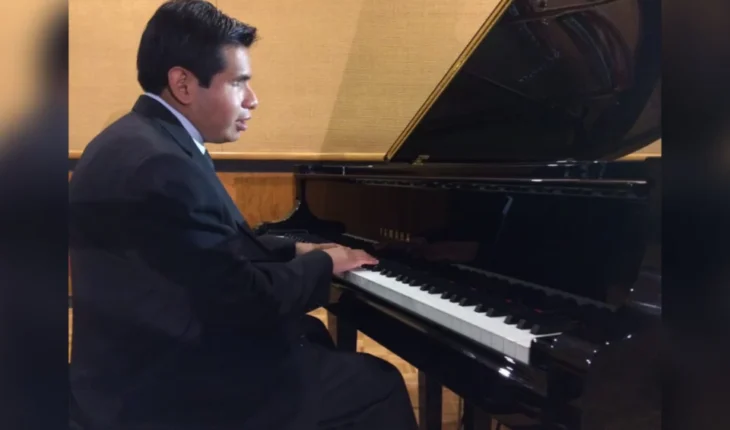When he was three years old, his grandfather gave him a small keyboard. Upon learning about this instrument, José Antonio López Gutiérrez, totally blind from birth, discovered that by combining sounds he could play melodies and songs that he heard on radio and television.
At the time I didn’t know anything about music theory. It was not until he was seven years old that he received his first lessons in a piano workshop with a blind teacher. Later, at the age of nine, he entered the Faculty of Music of the UNAM (formerly, National School of Music), to study piano, solfeggio and choral ensembles; from there, he discovered his vocation and, when the right time came, he decided to pursue a degree in piano at the same institution.
At 33 years old, José Antonio, who uses a white cane as support, has three big dreams: to be a music producer, to play with an orchestra or chamber ensemble, and to know Europe, especially Spain and Germany.
In an interview, he explains the challenges of being a blind pianist and what he seeks to express to the public when playing in his concerts.
Why did you choose the piano and not another instrument?
I would say, rather, that the piano chose me. My grandfather gave me my first keyboard and later gave me two more. Afterwards, my teacher, a cousin and a friend each gave me a keyboard. In the end I had to sell all these objects to buy an acoustic upright piano.
What is your biggest challenge as a blind pianist?
The difficulty to study a musical work, since I always need the support of a normovisual musician to help me read the score. However, as first resources, I use the ear and braille musicography.
Read: “If you have a dream, don’t stop until you get it, and don’t let anything limit you”: Arlet, violinist with a disability
What songs do you are most moved to perform and why?
If we talk about commercial music, my favorite to perform are the romantic ballads of the 70s and 80s, in addition to instrumental and Catholic music. As far as concert music is concerned, I love baroque for two reasons: the first, my favorite composer is Juan Sebastian Bach, and the second, for polyphony, that is, the interaction of several independent melodic lines that are intertwined in such a way that when listening to them I imagine them as a conversation between people in which each voice or melodic line represents a character. In commercial music, every song and melody has its own thing, some I just like and others move me.
How do you train to be a professional pianist?
Through the practice of the instrument and updating my musical and general knowledge. Dedicating eight hours a day would be ideal; however, for some other activities, it is not always possible.
What are your next plans?
Prepare myself to give concerts as a soloist and in orchestra. Travel and have the means to perform music production.
Who has supported you the most throughout your career and what has been the biggest compliment you received?
My mom Teresa of Jesus. I am also infinitely grateful for the support of my piano teacher Adriana Sepúlveda. And of the flattery, a high school student once told me “god bless your hands.”
What’s the most emotional concert you’ve given and why?
Saturday, March 4, 2017 was a significant day because I performed my titling concert.
What do you like to express to the audience when you play the piano?
Express my feelings and, above all, reflect what the author wanted to manifest in the work or musical works that I have the opportunity to interpret.
Do you consider music to be universal and inclusive?
It is universal because, for example, it happens that a foreigner learns the song of “Cielito lindo”, and although he does not understand the meaning of the words, the music is catchy. It is also inclusive because the ability to combine rhythms and sounds does not distinguish boundaries.
What do you do when you don’t play the piano?
I like to read (especially the narrative genre) and take courses on audio editing.
Have you ever suffered discrimination?
Some solfeggio teachers did not accept me into their chair. They told me that they didn’t know how to work, that they weren’t trained; this happened to me especially in group classes.
You can read more stories like this on the site Me too.
What we do in Animal Político requires professional journalists, teamwork, maintaining dialogue with readers and something very important: independencia. You can help us keep going. Be part of the team.
Subscribe to Animal Político, receive benefits and support free journalism.#YoSoyAnimal





